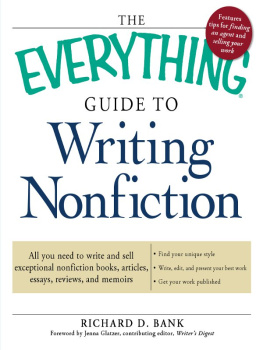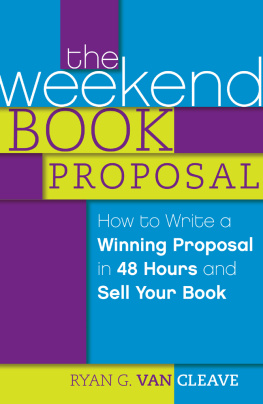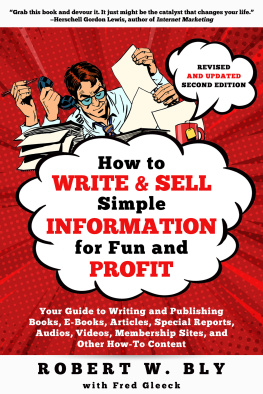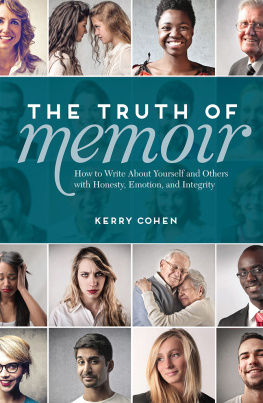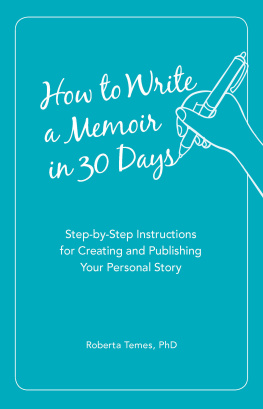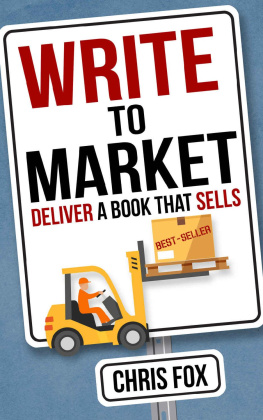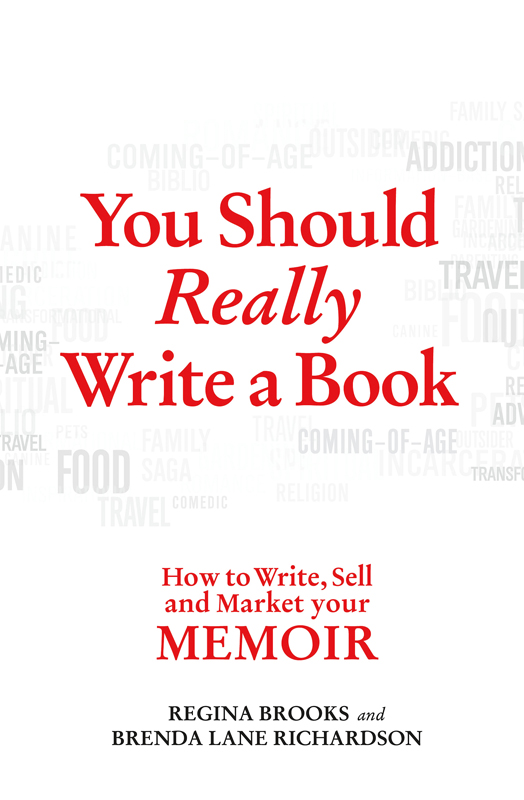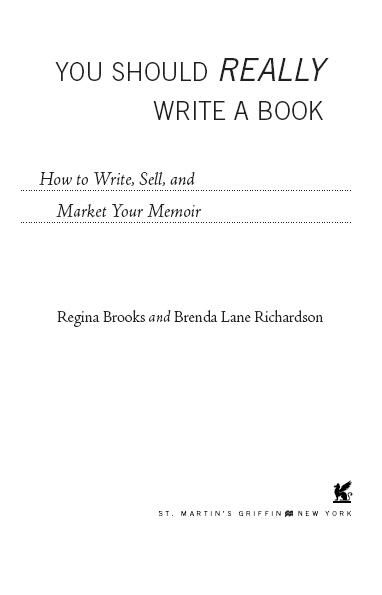
The author and publisher have provided this e-book to you for your personal use only. You may not make this e-book publicly available in any way. Copyright infringement is against the law. If you believe the copy of this e-book you are reading infringes on the authors copyright, please notify the publisher at: us.macmillanusa.com/piracy.
With love to Tiger, who was born with a writers heart.
B.L.R.
For my mother, Nolia M. Brooks
They say we earn our living by what we do, but we make a life with what we give.
Thank you for giving my story life and my life story.
R.B.
This book could not have been written without Regina Brooks, my agent and friend. I am also enormously grateful to Daniela Rapp, editor for St. Martins, for her encouragement and passion for this subject. Thanks be to God for my husband, the Reverend Doctor W. Mark Richardson, our sons, H.P. and Mark Jr., our daughter, Carolyn, and our grandson, Tiger.B.L.R.
To Julie Silver from The Harvard Writers Course (www.harvardwriters.com), thank you for providing a platform. Listening to doctors stories gave me the spark to write this book. To Jane Friedman, you are my kindling. Thanks for being a sounding board for crafting this idea. To Brenda, thank you for being the fire keeper. With your relentless research, you skillfully gathered all the literary embers needed to bring this book to life. I couldnt have done this without you. To Daniela Rapp, my editor, your enthusiasm and belief in this book provided much-needed fuel. Thank you for your patience and incisive input. This project is all the better because of you. To Adam Janusz, my cover designer, thank you for helping me to see that light comes in so many hues and shines in all directions. And to Katharine Sands, who always reminds me to feed my inner flame.
Thanks to my dad, Robert R. Brooks, my mom, Nolia M. Brooks, and my sister, Vivian A. Hariharan, and to all my friends who are my family. Thanks to the St. Martins team of professionals: designer Michelle McMillian and publicist Katie Ginda. Finally, to the Serendipity Literary Agency staff; your assistance and teamwork provided space for me to work on this project.R.L.B.
CONTENTS
INTRODUCTION
More Than an Interesting Story
Its spring in Boston and I am sitting with a panel of other publishing professionals, listening to an accomplished and elegantly groomed young woman who, hoping to get published, is delivering the final book pitch of the day. She describes a time that left her praying that she would die, and she had tried to, and yet, here she is. Hoping to inspire others with a memoir of prevailing over impossible circumstances, she is one of scores of conferees attending Harvard Medical Schools workshop, Publishing Books, Memoirs, and Other Creative Non-Fiction.
This annual course, attended by participants of various professional backgrounds, including Harvard Medical School grads, surely brings together some of the smartest aspiring writers in the country. I am one of several literary agents among a larger group of publishing professionals invited to help individuals strengthen their writing chops and polish the seventy-second story pitches that they hope to one day see expanded into books.
And what of the young would-be writer? After listening attentively to our advice and encouragement, this young woman, whose personal details have been changed for the purpose of anonymity, returned to the audience, joining other conferees, leaving me deeply moved by her presentation. Despite her arresting presence and the dramatic events in her life, I would not be willing to wager whether her story will ever be transformed into a manuscript that I, or any agent, can sell to an editor for publication.
After fifteen years of listening to pitches and reading thousands of query letters and first chapters, one of the things I know for sure is that just because something interesting happened to someone doesnt mean that she has the makings of a memoir. In todays book business, a good story simply isnt enough.
People may have told you that the events in your life have been so dramatic that you should really write a book. The challenge, though, is not only how to write the story and make it readable, but how to sell and market it, too. While this book does not aim to give you line-by-line writing, editing, or structural advice, it is designed to show you how to turn your dream of writing a published memoir into a reality, from conceiving the story to selling and marketing it.
Writing, selling, and marketing are the operative words here. Most people assume that its best to write a memoir first and then consider how to sell and market it. But these days, thats a counterproductive idea. Working through You Should Really Write a Book can make the difference between producing a manuscript written to appeal to friends and relatives versus one that can convince an agent to invest energy and time on your behalf in trying to sell it to an acquisitions editor for publication.
Im aware that many memoirists write for the sake of posterity, while others write to reexamine their past and heal from traumatic experiences. A parent or grandparent might write a memoir to pass on familial information. Someone working with a therapist might write a memoir for the purpose of resolving hurtful experiences.
Some may choose to self-publish, or may have no desire to work with an agent or a publishing house. The good news for them is that with the growing popularity of electronic books (e-books) and self-publishing, it has become easier for authors to get their work produced without going through traditional publishers.
The nontraditional route may prove fruitful to some, including Laurel Saville, who chronicled her mothers downward trajectory, from beauty queen to homeless murder victim, in a 2009 self-published memoir. then offered to republish the book. Saville reportedly struck a deal with the online booksellersans literary agentand without receiving an advance, as she would have with a traditional publisher. The retitled Unraveling Anne (AmazonEncore: 2011) was made available directly to the sites buyers.
Saville is far from the first self-published author to work the nontraditional route via Amazon. By December 2011, thirty authors of various genres had each sold more than 100,000 copies of their books via Amazons Kindle self-publishing program, with a dozen others selling more than 200,000 copies, according to The Wall Street Journal . Sara Burleton began selling her 2010 self-published story, Why Me? , as one of Amazons Kindle offerings. Her coming-of-age story, which recounts the severe physical and mental abuse she suffered at the hands of her mother, became a New York Times e-book bestseller. The measure of these publisher-bypassing deals and similar ventures will be watched closely in the marketplace.
Traditionally printed books and electronic versions are often portrayed as having an adversarial relationship, but as Robert Darnton explains in The Chronicle of Higher Education , while the sale of e-books doubled in 2010, there are indications that the sale of printed books has increased at the same time. The enthusiasm for e-books may have stimulated reading in general, and the market as a whole seems to be expanding. Worldwide, Darnton also points out, one million printed books were expected to be produced in 2011, a figure not including those printed by nontraditional methods.
Nontraditional methods include self-published titles. I often meet and teach authors who have taken this kind of independent route. More than 133,000 self-published titles were released in 2011, up from 51,237 in 2006, according to The Wall Street Journal . With a riveting story line captured on 60 Minutes, Sibel Edmonds might have easily been picked up by a trade publisher for her whistle-blowing face-off with the FBI, but she self-published her book Classified Woman: The Sibel Edmonds Story. Some authors also earn money by distributing books on their own. And it is not just Amazon that is offering e-book opportunities. As a USA Today article pointed out, an author can digitally format her own manuscript, set a price, and sell it to readers through a variety of online retailers and devices. The reading audience is vast, and there is room for mavericks. What remains unchanged is that working through literary agents and traditional publishing houses is still considered the gold standard.


